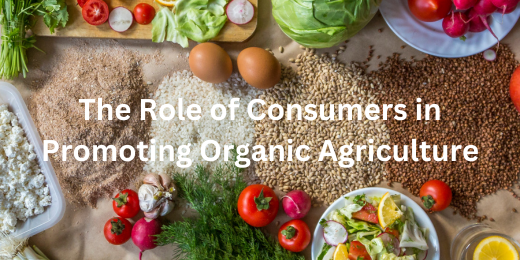
The Role of Consumers in Promoting Organic Agriculture
Consumer role in organic agriculture
Understanding Organic Agriculture
Organic farming is grounded in principles that deliberately exclude synthetic chemicals and prioritise the use of natural processes, ensuring the cultivation of crops through environmentally friendly and sustainable methods. Consumer role in organic agriculture is crucial in supporting these methods. Organic produce offers numerous health benefits and promotes environmental sustainability.
The advantages of organic agriculture are evident in reduced pesticide exposure and improved soil health. By choosing organic products, consumers contribute positively to the environment and their health. Organic agriculture consumer impact is significant, as it encourages sustainable practices and supports eco-friendly farming.
Despite its benefits, organic farming faces challenges such as higher costs and limited availability in India. Organic farmers often struggle with market access and competition from conventional produce. Increasing consumer demand can help overcome these obstacles and promote broader adoption of organic agriculture.
The Power of Consumer Choice
Consumer demand significantly influences agricultural practices by driving the market towards preferred products. The consumer role in organic agriculture is essential in shaping farming methods through purchasing choices. Supporting local organic farmers helps ensure that sustainable practices are widely adopted and promoted.
Choosing to support local organic farmers directly affects their ability to continue farming sustainably. When consumers prioritise organic products, it boosts local economies and encourages environmentally friendly practices. The organic agriculture consumer impact is evident as it drives the growth of organic markets and supports small-scale farmers.
Reading labels and certifications is crucial for informed consumer decisions about organic products. Labels provide vital information about the farming practices used and ensure product authenticity. Consumers can thus make choices that align with their values and support the growth of organic agriculture.
Incorporating Organic Foods into Your Diet
Incorporating organic foods into daily meals can be achieved by using fresh produce in various recipes. The consumer role in organic agriculture is enhanced by selecting organic vegetables and fruits regularly. Simple additions, such as organic greens in salads or fruit in smoothies, support a healthier diet.
Buying organic products on a budget can be managed by choosing seasonal produce and purchasing in bulk. Look for local farmers’ markets for affordable organic options and compare prices to find the best deals. The organic agriculture consumer impact grows as more individuals opt for cost-effective organic choices.
Utilise locally available organic ingredients to create nutritious and flavourful recipes, such as vegetable stir-fries and fruit salads. Local organic produce is frequently more vibrant and flavourful due to its recent harvest, and it actively supports local farmers by fostering regional economic growth and encouraging sustainable agricultural practices. Experiment with recipes that highlight these ingredients, enhancing both taste and health benefits in your meals.
Spreading the Word About Organic Living
Encouraging readers to share their organic journey on social media can help spread awareness and inspire others. The consumer role in organic agriculture is amplified when individuals publicly advocate for sustainable living practices. Sharing personal experiences and tips can motivate others to embrace organic choices in their lives.
Hosting community events or workshops focused on organic farming can significantly enhance awareness and provide valuable education on sustainable practices. These gatherings provide valuable information about the benefits and practices of organic agriculture. By engaging the community, individuals can enhance the organic agriculture consumer impact and foster broader support for organic farming.
Educating friends and family about the benefits of organic products is crucial for building a supportive network. Informing loved ones about the health and environmental advantages of organic living encourages collective action. A well-informed community contributes significantly to the adoption of organic practices and sustainable living.
Supporting Organic Initiatives
Government policies play a significant role in promoting organic agriculture by providing necessary support and regulations. The consumer role in organic agriculture is supported when policies create a favourable environment for organic practices. Effective policies can incentivise farmers and ensure the growth of organic farming practices.
Fair prices for organic farmers are crucial for their sustainability and motivation to continue farming organically. When consumers are willing to pay a premium, it helps maintain fair compensation for organic producers. The organic agriculture consumer impact is enhanced when there is a balanced market that supports both farmers and consumers.
Supporting research and development in organic farming is essential for advancing sustainable practices and improving yields. Investments in R&D can lead to innovations that benefit both farmers and consumers. Encouraging such support will strengthen the organic sector and promote more widespread adoption of sustainable agriculture.
The Future of Organic Agriculture in India
Organic farming has the potential to significantly boost rural employment by creating new job opportunities in agriculture. The consumer role in organic agriculture is crucial as increased demand can lead to more job creation. This growth can benefit rural communities by providing stable, sustainable livelihoods.
Technology plays a vital role in promoting organic agriculture by enhancing farming techniques and efficiency. Advances in technology can support organic practices and improve crop yields, making farming more viable. The organic agriculture consumer impact is significantly amplified as advanced technology facilitates the efficient meeting of increasing consumer demands for organic produce.
A sustainable food system offers long-term benefits, such as improved environmental health and reduced dependency on synthetic inputs. Emphasising organic farming practices helps ensure a resilient and sustainable agricultural sector. These practices contribute to long-term food security and environmental conservation in India.
For comprehensive information on organic farming and products, visit the nearest Uyir Organic Farmers Market or explore online resources at www.uyironline.in or www.uyirorganic.farm for detailed insights.